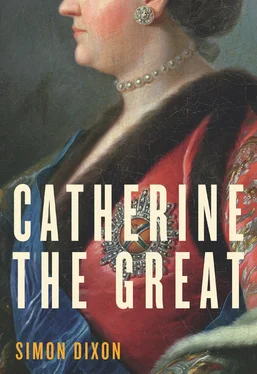On the following morning, the Commission began its formal proceedings in the Palace of Facets. Once Bibikov had duly been chosen as its marshal, the deputies listened to a public reading of her Instruction by Grigory Orlov. Though Catherine had compiled her treatise in French, each deputy was presented with a copy of the Russian translation by her secretary, Grigory Kozitsky, published simultaneously with a German version on 30 July. ‘There is not a foreign word in it,’ the empress boasted in a characteristic effort to advertise the richness and subtlety of her adopted language. ‘However, the subject matter is not of the simplest, and I hope that no one will mistake one word for another.’ 69Fond of listening to her friends read to her (and conscious of the illiteracy of a good proportion of the Russian elite), Catherine had written her text to be read aloud, giving it ‘an urgent rhythm’ by imitating Montesquieu’s series of ‘short, staccato chapters’ in 526 laconic paragraphs of her own. 70Even so, it took a full five sessions of the Commission to hear it out, as Yelagin and Volkov succeeded Orlov on the reader’s podium. 71
Catherine was not an original thinker and the Instruction was not a systematic work. Yet there was nothing conventional about her treatise. It set out her vision of a tolerant, educated society in which her subjects’ liberty and property would be protected by unambiguous laws, established by a virtuous absolute sovereign and implemented by judges who were to presume the accused innocent until proved guilty. The widespread nineteenth-century belief that she had suggested that it was better to release ten guilty people than convict a single blameless man prompted Solzhenitsyn to quip that Stalin had reversed the empress’s maxim by preferring to incarcerate 999 innocents rather than miss a single genuine spy. Although there is no such passage in the Instruction—it was Diderot, in his critical commentary on the text, who declared that ‘for humanity’s sake, we should allow a crime to escape unpunished rather than put innocence to death’—the legend says much about the Instruction’s reputation as a repository of Enlightened thought. 72Never had such radical ideas been publicly proclaimed by a Russian ruler.
‘Russia is a European State.’ Catherine began her first chapter with one of her few original contributions to her treatise, a cultural rather than a geographical claim, designed to challenge the prevailing view of her empire as a slough of oriental backwardness. The same motive underlay her implicit argument that Montesquieu had been wrong to classify Russia as a despotism ruled by fear, the only form of government he thought workable in a very large state and the ultimate insult in the vocabulary of eighteenth-century politics. Catherine instead presented Russia as an absolute monarchy in which the sole ruler voluntarily accepted the limitations imposed by fundamental laws. Historians have argued ever since about the plausibility of this claim, resorting to precisely the sort of semantic debates that the empress hoped to avoid. Her intention was almost certainly not to distort Montesquieu, but rather to adapt the ideas of a writer she admired to Russian circumstances about which he knew little. Even so, there were obvious difficulties with her position. Although contemporary thinkers disagreed about the nature of the fundamental laws by which they set such store, an inviolable law of succession was generally taken to be central. We know from an incomplete draft, written in her own hand and dating from after 1767, that Catherine eventually contemplated such a law. But since it was impossible to promulgate one without admitting that she had taken the throne by force, there was no mention of the subject at the time of the Legislative Commission. 73
Serfdom was another controversial question on which the final version of the Instruction said little. Prompted partly by her experiences with Pastor Eisen, Catherine had initially been prepared to contemplate ways of ‘creating new citizens’ (that is, reducing the number of serfs), for example by allowing serfs to accumulate sufficient property to purchase their freedom. But these radical proposals were swiftly dropped after she showed drafts of her treatise to her confidants. Panin famously declared that they were ‘maxims to bring down walls’. Catherine was particularly astonished to discover that even Alexander Stroganov—‘a gentle and very humane person’ who was ‘kind to the point of weakness’—defended ‘the cause of slavery with fury and passion’: ‘There were not twenty people at that time, who thought on that subject like human beings.’ In the circumstances, the best that could be done was to condemn the mass enserfment of free men and to restrict abuses by exhorting masters to treat their serfs with humanity. Meanwhile, Chapter 11 of the Instruction left the deputies in no doubt of the virtues of social stability: ‘There ought to be some to govern, and others to obey.’ 74
The empress was on surer ground when she turned her practical mind to matters of crime and punishment. Since it was a besetting problem of Russian justice that not even the judges could be sure what the laws actually said, her Instruction identified clarity, precision and uniformity as the key requirements for future legislation. Only if laws were written in plain language and imposed with predictable regularity could her subjects have confidence in the courts. Deterrence was no less important: ‘By making the penal laws always clearly intelligible, word by word, every one may calculate truly, and know exactly the inconveniences of a bad action; a knowledge which is absolutely necessary for restraining people from committing it.’ 75Judges were to execute rather than interpret the laws since to interpret a law was almost always to corrupt it and only the sovereign had the right to interpret laws which she had made. Nothing could be so dangerous as the idea that the spirit of the law was more important than the letter. That way, ‘we should see the same crimes punished differently, at different times, by the very same court of judicature.’ Torture was firmly declared ‘contrary to all the dictates of nature and reason; even mankind itself cries out against it’. Catherine was equally opposed to the death penalty: ‘The most certain curb upon crimes, is not the severity of the punishment, but the absolute conviction in the people, that delinquents will inevitably be punished.’ Even so, it was better to prevent crimes than to punish them, and that made education a clear priority: ‘Would you prevent crimes? Order it so that the light of knowledge may be diffused among the people.’ But were there enough people? As we have seen, Catherine shared the widespread contemporary anxiety—particularly acute in the vast, empty spaces of the Russian empire—that the world’s population had fallen since classical times. The way to increase it was to make people happy: ‘The more happily people live under a government the more easily the number of the inhabitants increases.’ 76
Such ideas may have been familiar to Enlightened circles in Western Europe, but to the majority of the empress’s humble provincial deputies they came as a bolt from the blue. The Commission itself was an equally stunning phenomenon. As Henry Shirley reported to Whitehall:
The Russians think and talk of nothing else, and in seeing the representatives of several nations, so very different both as to dress, customs, and religion, such as the Samoiedes, Cossacks, Bulgarians, Tartars etc., and whom they suppose to be (perhaps not without foundation) entirely dependants of the Russian Empire, assemble in their capital, they are apt to conclude, that they are now the wisest, the happiest, and the most powerful nation in the universe. 77
The barely concealed note of sarcasm reflected Shirley’s disappointment that Catherine had failed to create an institution on the model of the Westminster Parliament. He was particularly offended by the secret gallery, originally built to allow female members of the Muscovite royal family to observe ambassadorial audiences, ‘from whence she can hear every thing that is said, without being seen’:
Читать дальше












